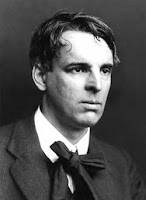'The man who does not read good books has no advantage over the man who cannot read them'
Mark Twain
Mark Twain
Showing posts with label William Butler Yeats. Show all posts
Showing posts with label William Butler Yeats. Show all posts
Sunday, 13 June 2010
On this day...
Irish poet William Butler Yeats was born in 1865. The son of an artist, Yeats was heavily involved in the creative field from a young age - an environment that also manifested itself in his siblings, who later became keen proponents of the Arts and Crafts movement. Although he attended local schools, Yeats was not an overly academic child, cited as being 'very poor in spelling', and preferred instead to spend time in his father's studio, where he met many of Dublin's leading writers. Yeats' first known works were produced a the age of seventeen, yet, heavily influenced by the likes of Shelley and Edmund Spenser, he found little success in the contemporary Victorian readership. Thus Yeats found his own style, rich in Irish folklore and incorporating instances of mysticism and spiritualism.
Returning to London, he co-founded the 'Rhymers' Club', giving London-based poets the opportunity to recite their works and gain peer appraisal, and Yeats continued his liteary philanthropy by establishing the Irish Literary Theatre for staging Irish and Celtic plays. Yeats became Ireland's first Nobel Prize Winner in 1923 for, 'inspired poetry, which in a highly artistic form gives expression to the spirit of a whole nation', yet he himself considered the award, given soon after Ireland's independence, as 'part of Europe's welcome to the Free State'. However, unusually, Yeats produced some of his best works, 'The Tower' and 'The Winding Stair and Other Poems', after the prize. He died in 1939, at the age of 73.
Wednesday, 17 March 2010
On this day...
As today is, of course, St. Patrick's day, it seems appropriate to have a look at some of the great literature Ireland has produced. Bursting forth with the dual force of playwrights Oscar Wilde and George Bernard Shaw, Irish literature really found its feet in the nineteenth and twentieth centuries.Of course there had been notable writers before, such as Jonathan Swift and Oliver Goldsmith, yet none had, or possibly ever will, hit the heights that both Wilde and Shaw achieved. 'The Importance of Being Earnest', 'The Picture of Dorian Gray', 'Pygmalion', 'Mrs. Warren's Profession' - all caused scandal, reality, shock or acceptance, yet above all, they are alll regarded as some of the finest examples of literature.
Although Wilde did write one novel, Ireland's best prose writers are found in the form of Bram Stoker, creator of 'Dracula', and later modernist James Joyce, whose best known work is 'Ulysses'. Finally, so as not to exclude any genre, Ireland has a history of great poets. William Butler Yeats is arguably the most recognisable, courtesy of such works of 'The Tower'. Yet, of course, Ireland still has a poet very much in the spotlight, in Seamus Heaney, creator of such collections as 'The Spirit Level'. Ireland has been the recepient of 4 Nobel Prizes for Literature, and can boast about having one of the oldest literary traditions, after Greek and Latin.
Friday, 27 November 2009
On this day...

Alfred Nobel signed his last will and testament in Paris in 1895, leaving a large proportion of his estate for the establishment of a prize. Best known as the inventor of dynamite, the Swedish chemist had been prompted to do this, after a premature obituary 7 years previous, in which it said: 'Dr. Alfred Nobel, who became rich by finding ways to kill more people faster than ever before, died yesterday'. His subsequent wish to leave a greater legacy meant that 31,225,000 Swedish Kronor were given to fund 5 prizes; one in physical science, one in chemistry, another in medicine, the fourth for literary work 'in a ideal direction', and the final one for service to the international fraternity. After Nobel's death in 1896, his family refused to follow these instructions, and therefore it was not until 1901 that the first Nobel Prizes were awarded. The list of Literature Laureates is prestigious, and includes names such as William Butler Yeats, George Bernard Shaw, John Steinbeck, Seamus Heaney and even Winston Churchill. To date there have been 102 Laureates.
Subscribe to:
Posts (Atom)

